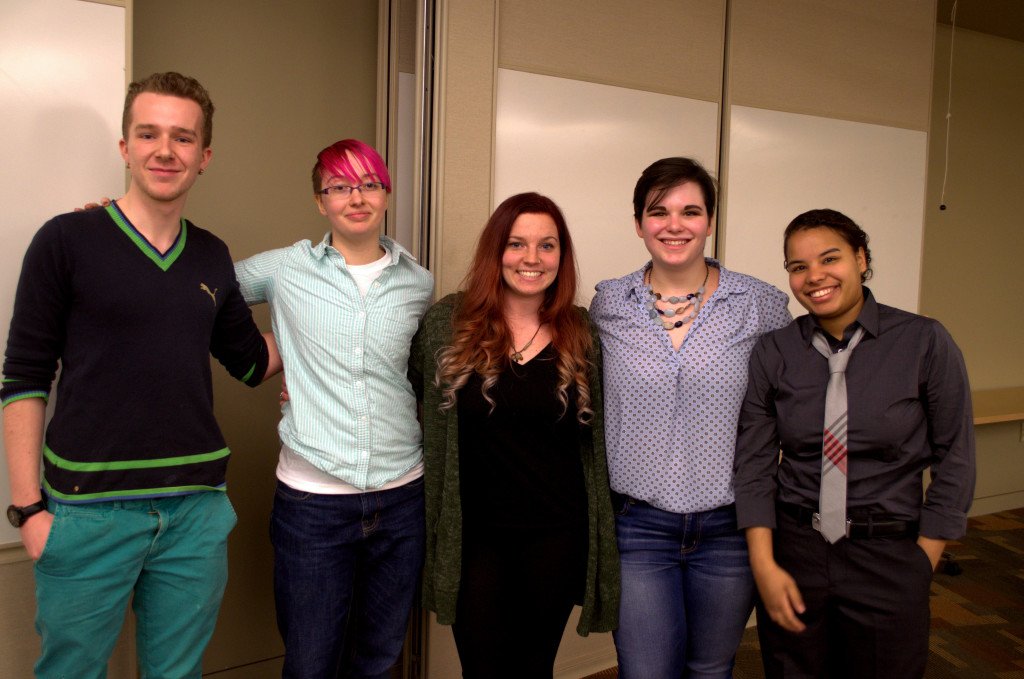
CAMRY DEAN
Special to The Leader
On March 30, the LGBT+/MOGII Study Abroad Panel was held, with members of the community sharing their stories and advice while living abroad and within other cultures.
The panel was moderated by Bridget Doyle, a junior history and political science double major, intern for the Office of Diversity, Equity, and Inclusion and Study Abroad Ambassador, who had the opportunity to spend last semester abroad in Rome.
“Italy itself is a conservative country in comparison to the United States,” she said to the full room. “One day, I stumbled upon a huge demonstration at the main train station. It was a protest with hundreds of people yelling and holding signs against gay marriage and the ability for gay couples to adopt children.
“It was after this experience that I realized we need to have more of a dialogue about what it’s like to study abroad as a member of the LGBT+ or MOGII community,” she said.
Depending on where a student decides to study, acceptance of unfamiliar genders or orientations can vary from open to facing extreme oppression.
Joe Drake, a junior video production and political science double major who studied in Barcelona, Spain, last Spring, spoke about his experience as being largely positive.
“From my experience, Barcelona was really accepting. There were a lot of queer spaces, such as bars or clubs, and there was actually a huge pride parade that I had just missed by a couple of months,” Drake said.
Skyler Rutkowski, a senior international studies and philosophy double major who studied in Kenya last semester, spoke about the harsh persecution LGBT+/MOGII individuals can face in her host country.
“In Kenya, you can be imprisoned 14 years to life for being part of a gay community” she said. “Before leaving, I decided I was going to live closeted, and I figured that I would tell my friends over time, as I grew closer to them. I noticed that even the people that were amazing and very open were still not open to different sexual orientations or identities.”
In places like Japan or Puerto Rico, the panelists recalled that it was more of curiosity and misunderstanding than lack of acceptance.
Darlene Cruz, a junior international studies and political science major who studied in Japan last Fall, and Meaghan Griffin, a senior molecular genetics major who studied in Puerto Rico in January 2014, spoke about being gender-fluid in a different culture.
“I think I confused some people while I was there. I’m gender-fluid, so one day I can be really girly and the next day I can be very masculine, and a lot of people aren’t used to that. I would actually get a lot of questions. The people were not shy,” Cruz said about her four months in Japan. “I didn’t hide who I was. I decided early on I wasn’t going to do that.”
“I didn’t receive any extreme persecution, but they did have a very strong emphasis on gender roles,” Griffin said about her time in Puerto Rico. “When I did not dress particularly feminine, I got some strange looks.”
The two also made it clear that their identities drew a lot of unwanted attention from men and that safety should be a main priority when choosing a destination.
Despite the possible injustice or lack of understanding for LGBT+/MOGII individuals, each of the panelists emphasized their love for studying abroad in their host cultures and would do it again in a heartbeat.
Erin Willis, assistant director for Study Abroad and Student Exchange, does her best to make sure all individuals considering studying abroad are comfortable.
“From my standpoint,” she said, “I advise students to go abroad, and, in my role, I don’t like to push any identity onto my students, so it’s always helpful from my perspective if the student is willing to ask the questions, because I’m not going to just make an assumption about someone.”
Rutkowski added that, despite some of the difficulties that came along with studying abroad, the experience was an overwhelmingly positive one.
“Just do your research. Studying abroad was the most transformative experience of my life,” Rutkowski said. “It was amazing, and even though I had to live a little bit more closeted than I do here, I learned more about my sexual identity, my gender identity and my white-ness. I learned so much about all of my identities, [and] even if I had to be a little uncomfortable, I don’t regret one minute of it.”
Doyle, who identifies within the MOGII community, organized the event to emphasize to MOGII and LGBT+ individuals the importance of stepping into uncomfortable spaces to learn, impact and demand their voices be heard.
“It is my hope that with continued conversation and open dialogue, we can encourage members of the MOGII community to diversify their surroundings,” she said. “We can be good allies and community members to those who seek out a support system prior to studying abroad. It’s no easy feat to leave your comfort zone, but those considering it should know that there are so many people that stand by you and want to give you the tools necessary in doing so.”
